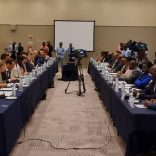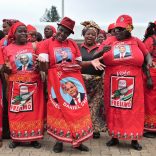One year on, Mondlane dreams of a semi-presidential constitution for Mozambique
Mozambique Elections: No new, legally required, ballot boxes for October 9 vote – due to lack of time and money

FILE - For illustration purposes only [File photo: DW]
The Mozambican National Elections Commission (CNE) will maintain the ballot boxes from the 2023 local elections in the October general elections, despite them not meeting the requirements of the new electoral legislation, claiming it does not have the time or money to make the changes.
According to a CNE resolution dated 12 September and consulted by Lusa on Tuesday, the issue at stake is the requirement – defined in the revision of the electoral law published in August – that the ballot box model to be used in the7th presidential and legislative elections and the 4th for provincial assemblies “must be transparent and must have a slot which allows for the insertion of one single ballot paper per voter”.
The resolution decides that “the type of ballot boxes used” in the October 2023 local elections will be maintained, given that the CNE “has already purchased 14,775 ballot boxes,” which “are already in the Customs clearance process in Mozambique”, to “add to the 64,106 ballot boxes left over from the last electoral process”.
It also claims that the “time interval between the entry into force of the revised electoral package on August 23, 2024 and the holding of the vote being 47 days” represents a period of time “insufficient to trigger administrative processes that would culminate in the contracting, production and transportation of the new ballot boxes”.
“As a rule, it is a minimum of 45 days for production and 90 days for their transportation to the national territory”, it reads.
On the other hand, the CNE also justifies the decision with the “lack of budgetary provision for the acquisition of new ballot boxes” for these elections”, considering that “the budgetary provision for this electoral process was made taking into account the reuse of the 64,106 ballot boxes from the previous process.”
The specific revisions to the electoral law in Mozambique, including the elimination of the powers of district courts to order a recount of votes in the elections, among the most controversial aspects, came into force in August, as previously reported by Lusa.
At issue are laws 14/2024 and 15/2024, of the Assembly of the Republic, published in the Official Gazette on August 23 and which establish, respectively, the Legal Framework for the Election of Members of the Provincial Assembly and the Provincial Governor and the Legal Framework for the Election of the President of the Republic and Deputies of the Assembly of the Republic.
Both laws were enacted by the Mozambican President, Filipe Nyusi, on August 21, after having “verified that they do not contravene the fundamental law”, the Presidency of the Republic indicated at the time, and came into force precisely on the eve of the start of the electoral campaign (August 24) for the general elections of October 9.
The changes to the electoral rules were approved on a case-by-case basis and definitively on August 8 – after a previous veto by the President of the Republic -, with 197 votes in favour of the Front for the Liberation of Mozambique (Frelimo, the party in power and holder of a parliamentary majority) and of the Mozambican National Resistance (Renamo, the main opposition party), and four votes against – from the Democratic Movement of Mozambique (MDM, the third largest political force in the country).
With the approval of the changes, parliament removed the power of district courts to order recounts in elections in the country, eliminating a point that led to the veto by the President of the Republic and returning the rules to parliament.
Previously, the Mozambican parliament had already changed the electoral law, expressly determining that district courts do not have the power to order a repeat vote in the elections in Mozambique, after the Constitutional Council invalidated decisions of that court that ordered a new vote in the local elections of 11 October.
Mozambique will hold presidential elections on 9 October, which will take place simultaneously with the legislative elections and elections for governors and provincial assemblies.












Leave a Reply
Be the First to Comment!
You must be logged in to post a comment.
You must be logged in to post a comment.